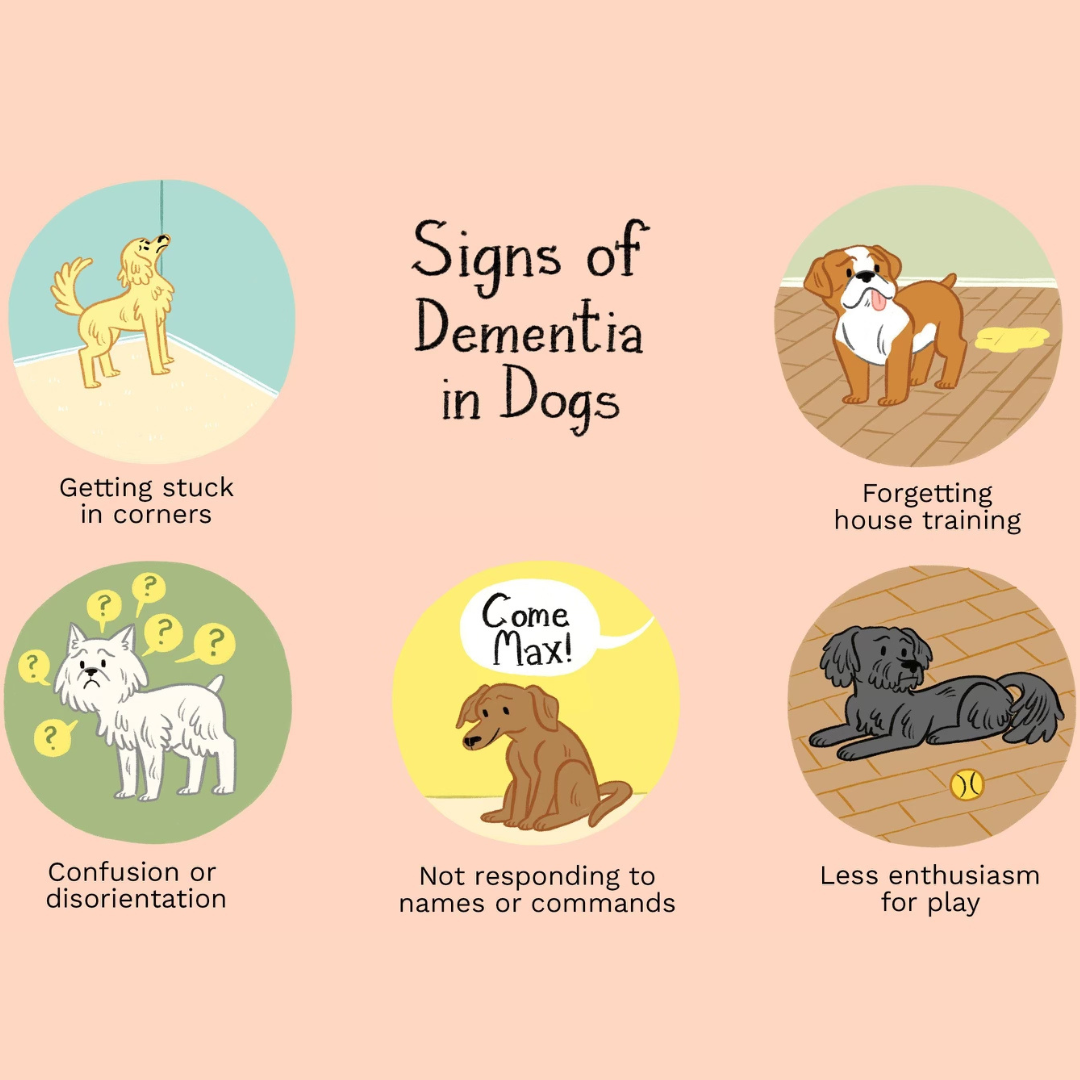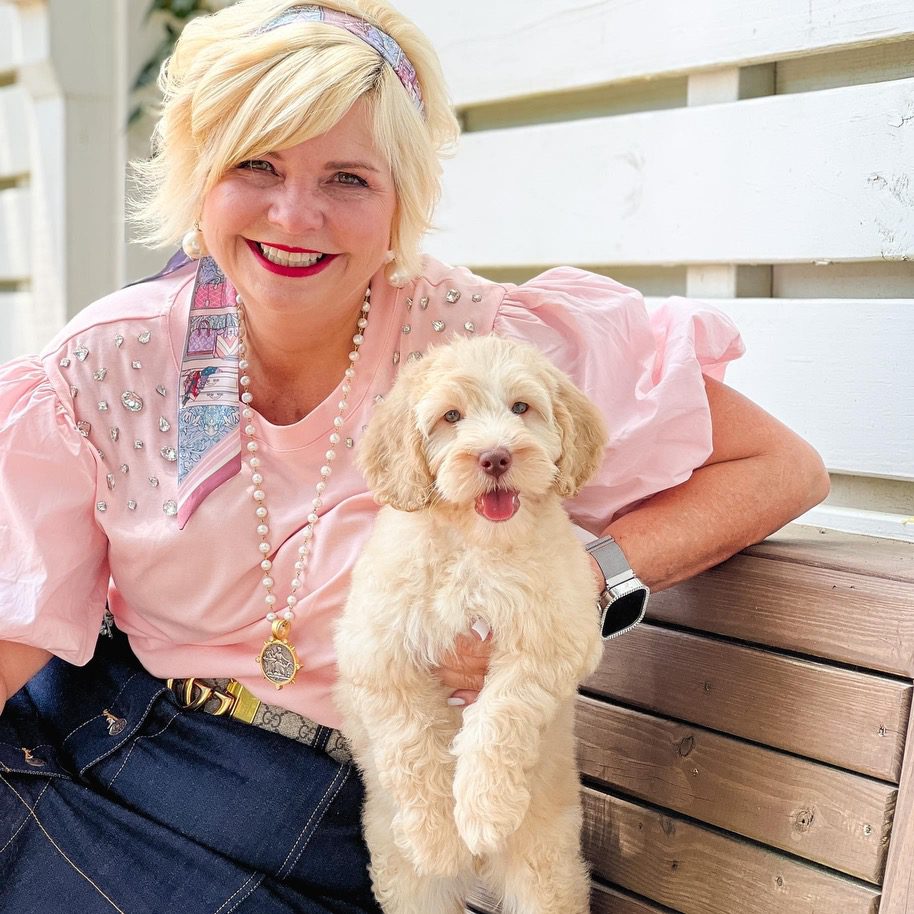
To my Smeraglia Doodle Family,
Today, I want to share something very close to my heart. As many of you know, my sweet London turned 14 in March, and she’s well on her way to being 15 years old. Watching her grow older has been a journey filled with love, concern, and a desire to make her senior years as comfortable as possible. I know many of you are experiencing similar feelings as your doodles age, and I want to share what I’ve learned about dementia in dogs to help you navigate this time with your beloved pets.
What is Dementia in Dogs?
Dementia, or canine cognitive dysfunction (CCD), affects a dog’s memory, learning, and comprehension. It’s similar to Alzheimer’s disease in humans and can be heartbreaking to witness. Recognizing the signs early and knowing how to care for your doodle can make a significant difference in their quality of life.
Signs of Dementia in Elderly Dogs
1.Disorientation: Your doodle might get lost in familiar places, like your home or yard. They may seem confused or stuck in corners or behind furniture.
2.Changes in Sleep Patterns: Increased restlessness at night and more sleep during the day. You might notice pacing or wandering aimlessly.
3.House Training Issues: Forgetting previously learned house training rules, leading to more accidents indoors.
4.Altered Interactions: Less interest in interacting with family members or other pets, increased irritability, or anxiety.
5.Activity Level Changes: Decreased interest in playing or going for walks, and repetitive behaviors like barking, licking, or circling.
6.Memory Loss: Forgetting familiar commands or routines, and difficulty recognizing familiar people or pets.
Caring for a Doodle with Dementia
1.Maintain a Routine: Keeping a consistent daily schedule can help reduce confusion and anxiety. Regular feeding times, walks, and bedtime routines are very soothing.
2.Create a Safe Environment: Ensure their living space is safe and free of hazards. Use baby gates to limit access to areas where they might get stuck or lost.
3.Provide Mental Stimulation: Engage them with gentle play, interactive toys, and simple training exercises. Short, frequent sessions keep their minds active without overwhelming them.
4.Comfort and Reassure: Offer plenty of affection and reassurance. Your presence can be incredibly calming. Soft, familiar bedding and comforting scents can help them feel secure.
5.Consult Your Vet: Regular veterinary check-ups are essential to monitor their health. There are medications and supplements that can help manage symptoms and improve quality of life.
Diagnosis and Treatment
If your dog is showing signs of senility or dementia, schedule a veterinary exam and consultation. Your vet will go over your dog’s health history and conduct a thorough examination, which may include blood work and urinalysis to check for other senior health problems. Based on these findings, additional tests such as X-rays, a CT scan, or an MRI may be ordered to rule out other health issues.
Once other health issues have been ruled out, your vet might determine that your dog has canine cognitive dysfunction. While the diagnosis of dementia can be difficult to handle, many dogs go on to live happy, healthy lives with proper care and attention.
There is no cure for dementia in dogs. However, there are some treatment options that can make your dog more comfortable:
•Medication: A common prescription drug called selegiline can help alleviate some symptoms of cognitive dysfunction in senior dogs. This drug works by increasing dopamine activity in the brain.
•Supplements: Omega-3 fatty acids, SAMe, medium-chain triglycerides (MCT), antioxidants like Denamarin, silybin, vitamin E, Cholodin, Solliquin, and melatonin can improve cognitive function or quality of life for some dogs. Consult your veterinarian for information about dosage and help with finding the right supplements for your dog.
There are also homeopathic treatments, herbal remedies, and other nutritional supplements that are said to benefit dogs with cognitive dysfunction.
Can You Prevent Dementia in Our Doodles?
While there is no guaranteed way to prevent dementia in dogs, there are steps you can take to potentially reduce the risk and support cognitive health:
1.Mental Stimulation: Keep your doodle’s mind active with regular training, puzzle toys, and new experiences. Mental exercises can help maintain brain function.
2.Physical Activity: Regular exercise is crucial for overall health, including cognitive health. Daily walks and playtime can keep your doodle’s body and mind engaged.
3.Healthy Diet: Feed your doodle a balanced diet rich in antioxidants, omega-3 fatty acids, and other nutrients that support brain health. Consult your vet for the best dietary options.
4.Routine Health Check-ups: Regular veterinary visits can catch early signs of health issues, including cognitive dysfunction. Early intervention can make a significant difference.
5.Social Interaction: Keep your doodle socially engaged with regular interaction with family members and other dogs. Social activities can help maintain their mental well-being.
A Heartfelt Note
It’s never easy watching our doodles age, but your love and care mean the world to them. They might forget a lot of things, but they will always know your love. Cherish the moments you have with them, and take comfort in knowing you’re providing them with the best care possible.
Our doodles have brought us endless joy and companionship over the years. As they enter their golden years, it’s our turn to give back by ensuring their remaining time is as comfortable and happy as possible.
Thank you for being part of our Doodle Family. If you have any questions or need support, don’t hesitate to reach out. We’re all in this together, caring for our beloved doodles.
With love,
Sherri
Thank you so much for taking the time to read through my blog. Every word penned here comes straight from my heart, as I aim to share with you the knowledge and insights I’ve gathered over the years. My deepest hope is that you find joy, inspiration, and perhaps a little bit of wisdom in these pages. Remember, this journey we’re on together is all about the love and connection we share with our furry friends. So, sit back, enjoy the read, and let’s continue to grow and learn in this beautiful adventure of companionship.
Warmest wishes,
Sherri Smeraglia

Notifications